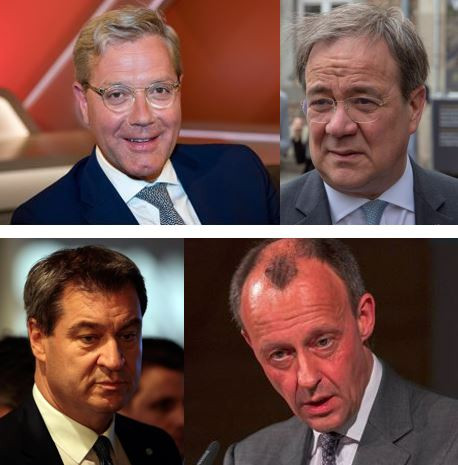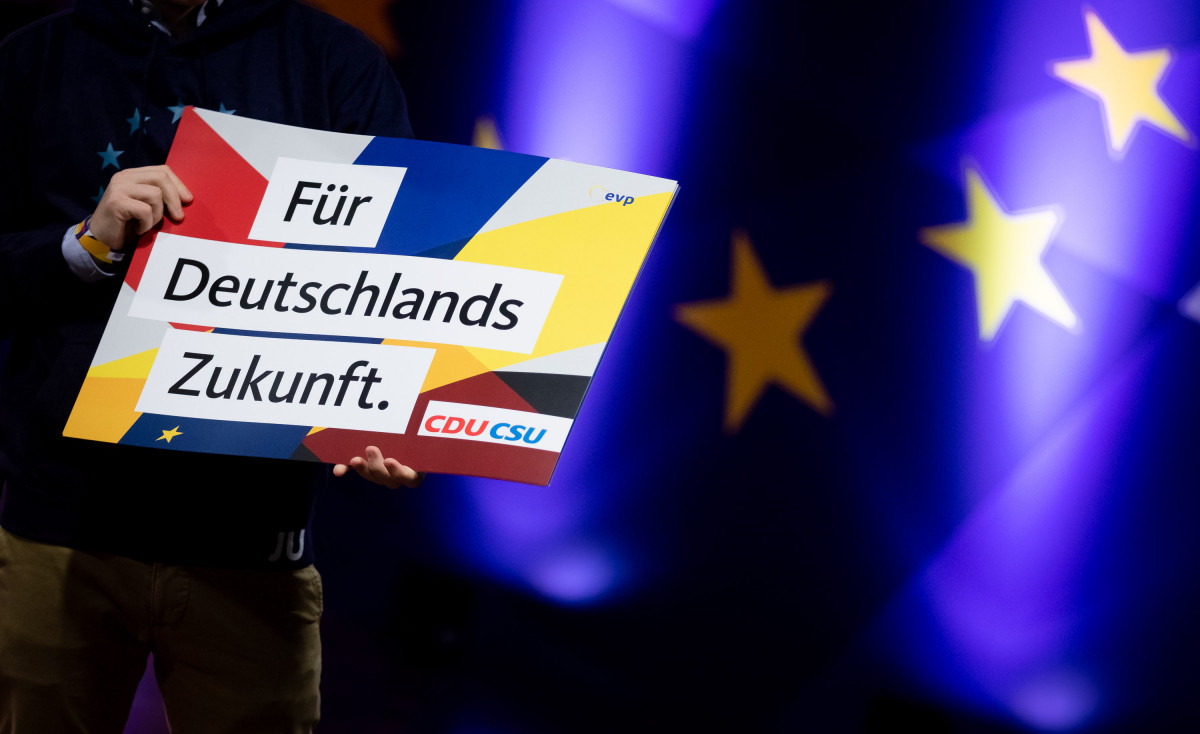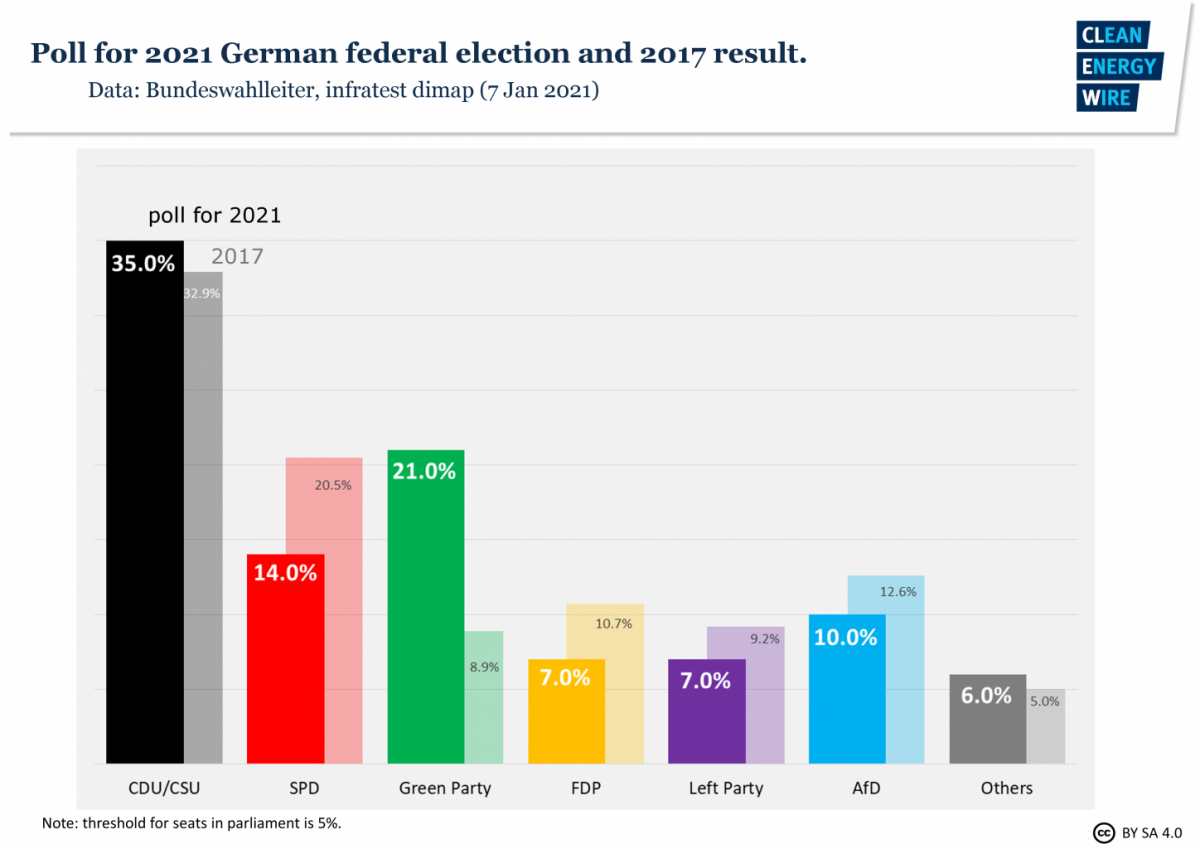German conservatives pick leader set to shape handling of Merkel's climate legacy

Germany faces the first of a series of votes this year that will ultimately determine the direction of the country’s – and Europe’s – climate and energy transition policy: On 15 January, the governing conservative Christian Democrats (CDU) will hold a digital convention to choose a new leader, who may follow outgoing Angela Merkel as Chancellor in September.
The result is expected to be announced a week later as the final vote is by mail. The new CDU chief would hold a strong chance to head the next government as the conservative CDU/CSU bloc is leading in the polls for the country's parliament election on 26 September - unless the popular leader of the Bavarian CSU clinches the top spot on the conservatives' ticket.
In any case, Merkel's planned retirement after 16 years in government, currently the longest period for any head of government in the EU, will put the new leader for the largest party in the bloc's biggest economy in a powerful position. The ramifications of the CDU vote for climate and energy policy may thus extend far beyond Germany's borders and the party’s choice will give an indication of how the country plans to balance the decarbonisation of its core economic sectors with growth and social cohesion.
The CDU party convention and leadership vote has been delayed by almost one year due to the coronavirus pandemic, which made a physical meeting of some 1,000 delegates difficult to manage. The convention will now be held virtually. It will kick off the packed political calendar in Germany in 2021, which will also include the federal parliamentary elections and votes in six of Germany’s 16 federal states. The party’s new leaders may either continue Merkel’s liberal centrist policies – including her increasingly progressive climate action since the 2017 federal elections – or may adopt a more reserved stance that puts greater emphasis on traditional industry-friendly policies.
From coal exit to carbon pricing and the mass roll-out of electric vehicles, Germany has initiated a range of decarbonisation measures in the context of its Climate Action Programme and the recently tightened EU emissions reduction goals. Against the backdrop of the coronavirus pandemic, the economic success of these future technologies -- especially in transport and green hydrogen production with renewables -- are key to Germany's and the European Commission's strategy to make climate action a driver of economic recovery. Whoever succeeds Merkel at the helm of the CDU will have a big say in how all this pans out – but will also face the task of keeping the CDU's vast and diverse party base together in the post-Merkel era.
The three contenders are: Armin Laschet (59), state premier of Germany's most populous state of North Rhine-Westphalia (NRW) and loyal to the chancellor; Friedrich Merz (65), an internal party rival from Merkel's early days as leader, who re-entered the political stage in 2018 to become the darling of the traditional conservatives; and Norbert Röttgen (55), a progressive who once was dubbed Merkel's "model pupil" before she sacked him as environment minister in 2012. But another competitor for the Chancellery stands ready if the winner fails to win enough favour among voters quickly. Markus Söder (54), leader of the conservative Bavarian CSU and premier of the economic powerhouse state, is a favourite choice for the next chancellor by many Germans in polls.
The last public debate between the three CDU candidates vying for the conservative top seat left climate activists disappointed. "None of the candidates proved to have a noteworthy concept for mastering the climate crisis," activist and renewables researcher Volker Quaschning said, adding that candidate Norbert Röttgen, head of parliament's foreign affairs committee, has at least signalled his readiness to step up the emissions reduction efforts. His competitors, Armin Laschet and Friedrich Merz, showed that they would be happy with "a mere continuation of the current and completely inadequate climate policy," Quaschning argued. Economist Claudia Kemfert said that Merz had made a particularly bad job in demonstrating that the CDU was ready to tackle one of the greatest challenges of the future. "Given the things that were said today, Merz is the worst choice,” Kemfert said.
Conservative candidates expect CDU top seat could lead them into Chancellery
The political think tank Eurasia Group lists chancellor Merkel's departure among the Top 10 risks of 2021. A power void after the departure of "Europe’s most important leader" could create significant turmoil within the EU at large and Merkel’s successor will thus face a tough start amid the pandemic and the looming threats of right-wing populism, the group argues. Political scientist Jürgen Falter of the University of Mainz does not see the end of the Merkel era quite as dramatic: "The CDU has become much more open to progressive policies than it used to be, especially regarding the climate." Whoever comes after her would therefore find a host of predefined paths that need to be followed and can only be abandoned at great cost. "In this respect, a lot of Merkel's era will live on," Falter told Clean Energy Wire.
The three candidates that vie for taking over the CDU chair will follow defence minister Annegret-Kramp Karrenbauer, Merkel's original favourite for the job who stunned the public and her own party when she declared in early 2020 she would step down after only one hapless year at the helm. But the true prize at stake at the convention arguably is not the CDU leadership itself, but rather the very real chance of becoming the next chancellor once Merkel retires after the general elections on 26 September.
Merz, Laschet and Röttgen all are household names among the Christian Democrats and all three will likely expect their party to also declare them candidates for chancellor if they are elected to preside over the CDU. But if the new CDU leader is perceived as weak, CSU head Söder might claim the conservative leadership sometime in spring and attempt to become the first chancellor from Bavaria.
During her 16 years in office, Merkel gained international praise for embodying the virtues of a pragmatic centrist. But critics argue that Merkel has hollowed out her party's conservative profile and made it somewhat indistinguishable from the more left-leaning Green Party and the Social Democrats (SPD), with whom Merkel formed three of her four coalition governments.
Whoever eventually prevails could thus put his mark on German politics for a whole decade to come. As of early 2021, opinion polls indicate that the CDU/CSU alliance will likely remain part of the next German government. The party and Merkel individually have received a lot of credit from voters for their perceived strong-handed management of the pandemic. But with the long-term leader on the way out, this bonus could ebb away quickly once voters focus on the figurehead in charge who follows her.
Commitments and voter wishes tie future leader into rigorous climate path
Each of the CDU hopefuls has stated that rigorous climate action will be a defining part of their agenda should they win the party leadership. Since the previous election, climate and energy have consistently moved up among voter priorities and remain high up irrespective of the coronavirus. A string of hot, dry summers that took a toll on the environment have contributed to a growing sense of urgency as have the massive climate protests led by the Fridays for Future movement, which put emissions reduction efforts at the heart of the public debate.
NRW state premier Armin Laschet is seen as most likely to continue Merkel's centrist course. But Laschet's difficulties in appealing to conservative voters outside the urban Rhineland region have led to suggestions that he should let popular health minister Jens Spahn, nominated as his running mate, move over to the driver's seat of their tandem. In energy and climate policy, Laschet has drawn criticism for his handling of climate protests in the context of Germany's coal exit. Lignite mining state NRW, home to Germany's largest energy company RWE, has been a key battleground for the brokering of the German coal phase-out. Laschet has been criticised for his generous stance on granting coal companies comfortable compensation payments and his government's handling of the protests in the Hambach forest near lignite mine in Garzweiler. However, he supported the compromise that will see his state do much of the heavy lifting in terms of early coal decommissioning and has moved on to an optimistic narrative that the core state of German heavy industry looks to a bright future based on the production and advanced use of green hydrogen. The programme he published together with Spahn shortly before the party convention was noted for being remarkably silent on climate issues.
The most radical rupture from Merkel's legacy, on the other hand, would be the election of Friedrich Merz, whom she replaced as CDU parliamentary group speaker in the early 2000s. Merz largely disappeared from the public sphere after 2009 to work as chairman of the supervisory board of the German branch of investment company BlackRock. He returned to the stage in 2018 but lost his first bid to become CDU leader against Merkel's favourite Kramp-Karrenbauer. He is the darling of the party's more conservative wing and has suggested that an ominous "party establishment" within the CDU is attempting to keep him away from the levers of power. Many think he stands the best chance of winning back votes from the far-right AfD, whose popularity has been waning amid ceaseless infighting and its confused stance on the pandemic. Climate and energy policy have never been topics Merz has held close to heart. He has recently remarked that his party had "lost track in the climate debate due to a young activist girl from Sweden." He said his preferred strategy for cutting emissions would be through an "ecologically renewed market economy" and not "curtailing our freedoms, bans or paternalism." He also used to be among the conservatives who vigorously opposed ending the use of nuclear power.
The third candidate, Norbert Röttgen, had initially been regarded as an outsider but gained some ground against his competitors during the months while preparations for the convention were on hold. He currently chairs the parliament's foreign affairs committee but had already served as environment minister under Merkel before she unexpectedly sacked him after performing badly in a NRW state election. Röttgen has kept a low profile in parliament ever since and focused on foreign policy issues. He has been a vocal critic of the Russian-German Nord Stream 2 pipeline project, often opposing government policy. He used to be among the earliest proponents within the CDU of an opening towards the Green Party, and in 2010 argued against party colleagues who pushed through an ultimately vain attempt to prolong the use of nuclear power. His position has been described as a compromise between sticking with Merkel's course and reshaping the conservatives’ profile.
Greens courted by conservative frontrunners could also seek alternative route to power
With NRW, Laschet has the largest CDU state association behind him, political scientist Falter said. Merz, on the other hand, is the most popular candidate among conservative voters and is backed by powerful party groups with industry links. But for the researcher, the choice among them ultimately will not define a major shift in key policy areas, even though their tone within the party and style of leadership definitely vary. Under Merkel, the party followed a general shift in society to the left to stay on top of the game, Falter argued. "She understood that in order to remain a leading political force, the conservatives need to follow the new 'Zeitgeist' of more social and ecological awareness."All three candidates have made it clear that a coalition with the Greens would be an option, he said. "Even Merz has made an effort to demonstrate that he takes the ecological challenges seriously." CSU leader Söder started openly courting the ecologist party after losing voters to the Greens in the 2018 Bavarian state elections and started to present himself as a progressive, making a so-called "black-green" coalition named after the parties' respective colours appear to be a very real option.
For Merz’s policy ambitions, however, the pro-business FDP party would arguably be a better fit. But it's uncertain whether the FDP would win enough votes to qualify as a partner for the conservatives. Since a coalition with the radical AfD is out of the question for any CDU/CSU leader, a new party leader and aspiring chancellor would have to look left of the centre and find the SPD, which longs to recover from its incessant drop in popularity in the past eight years on Merkel's side.
The Greens, meanwhile, enter the election year with confidence. One of their two co-leaders -- Annalena Baerbock and Robert Habeck -- could become the party’s candidate for chancellor. According to Falter, just a small shift in voter preferences would be enough to make the conservative CDU/CSU alliance lose power after all. "If the Greens see any possibility to form a coalition with the SPD and the Left Party under their own leadership, they will most likely choose this route and attempt to delegate the chancellor themselves," he said. "A lot can still happen before September."



